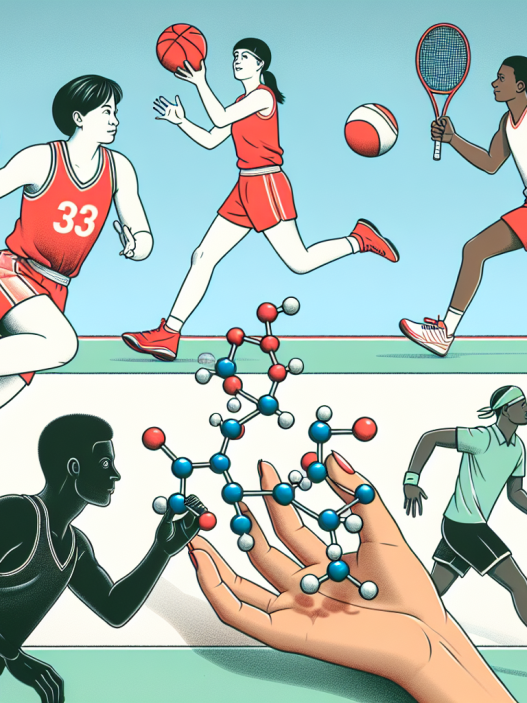-
Table of Contents
Magnesium Benefits for Athletes and Sports Enthusiasts
Magnesium is an essential mineral that plays a crucial role in various bodily functions, including muscle and nerve function, energy production, and bone health. It is also a popular supplement among athletes and sports enthusiasts due to its potential performance-enhancing benefits. In this article, we will explore the pharmacokinetics and pharmacodynamics of magnesium and its potential benefits for athletes and sports enthusiasts.
Magnesium Pharmacokinetics
Magnesium is primarily absorbed in the small intestine and is then transported to various tissues and organs through the bloodstream. The absorption of magnesium is influenced by several factors, including the form of magnesium, the presence of other nutrients, and the individual’s overall health status.
The bioavailability of magnesium varies depending on the form of magnesium. For example, magnesium oxide has a lower bioavailability compared to magnesium citrate or magnesium glycinate. This is because magnesium oxide is less soluble and is more likely to cause gastrointestinal side effects, such as diarrhea, which can decrease its absorption.
Additionally, the presence of other nutrients, such as calcium and vitamin D, can affect the absorption of magnesium. These nutrients work together to maintain proper bone health and muscle function. Therefore, it is essential to ensure adequate intake of these nutrients to optimize magnesium absorption.
The elimination of magnesium occurs primarily through the kidneys, with a small amount being excreted through sweat. The kidneys play a crucial role in maintaining magnesium balance in the body by filtering out excess magnesium and reabsorbing it when needed.
Magnesium Pharmacodynamics
Magnesium is involved in over 300 biochemical reactions in the body, making it an essential mineral for overall health and well-being. In terms of athletic performance, magnesium plays a crucial role in energy production, muscle contraction, and protein synthesis.
One of the primary ways magnesium can benefit athletes and sports enthusiasts is by improving energy production. Magnesium is a cofactor for the enzyme ATP synthase, which is responsible for producing ATP, the body’s main source of energy. Adequate levels of magnesium can help ensure efficient energy production, which is crucial for athletic performance.
Magnesium also plays a role in muscle contraction and relaxation. It works together with calcium to regulate the flow of calcium ions in and out of muscle cells, which is essential for proper muscle function. Low levels of magnesium can lead to muscle cramps and weakness, which can negatively impact athletic performance.
Furthermore, magnesium is involved in protein synthesis, which is crucial for muscle growth and repair. Studies have shown that magnesium supplementation can increase muscle protein synthesis, leading to improved muscle strength and performance (Cinar et al. 2018).
Magnesium Benefits for Athletes and Sports Enthusiasts
Based on its pharmacokinetics and pharmacodynamics, magnesium has several potential benefits for athletes and sports enthusiasts. These include improved energy production, enhanced muscle function, and increased muscle protein synthesis.
In addition to these performance-enhancing benefits, magnesium may also help reduce the risk of injury and aid in recovery. Studies have shown that magnesium supplementation can improve bone density and reduce the risk of stress fractures in athletes (Cinar et al. 2018). It may also help reduce inflammation and oxidative stress, which are common factors in sports-related injuries (Nielsen et al. 2017).
Moreover, magnesium has been shown to have a positive impact on cardiovascular health. It can help regulate blood pressure and improve blood flow, which is crucial for endurance athletes (Nielsen et al. 2017). It may also help reduce the risk of heart disease and stroke, which are common concerns for athletes and sports enthusiasts.
How to Incorporate Magnesium into Your Routine
The recommended daily intake of magnesium for adults is 400-420 mg for men and 310-320 mg for women. However, athletes and sports enthusiasts may require higher doses due to increased magnesium loss through sweat and urine. It is essential to consult with a healthcare professional to determine the appropriate dosage for your individual needs.
Magnesium can be obtained through diet, with good sources including leafy green vegetables, nuts, seeds, and whole grains. However, supplementation may be necessary for those with low magnesium levels or increased magnesium needs. It is crucial to choose a high-quality supplement with a form of magnesium that has high bioavailability, such as magnesium citrate or magnesium glycinate.
It is also important to note that excessive intake of magnesium can lead to adverse effects, such as diarrhea, nausea, and abdominal cramping. Therefore, it is essential to follow recommended dosages and monitor your magnesium levels regularly.
Conclusion
Magnesium is an essential mineral with numerous benefits for athletes and sports enthusiasts. Its pharmacokinetics and pharmacodynamics make it a valuable supplement for improving energy production, muscle function, and protein synthesis. It may also help reduce the risk of injury, aid in recovery, and improve cardiovascular health. However, it is crucial to consult with a healthcare professional and monitor magnesium levels to ensure safe and effective use.
Expert Comments
“Magnesium is a vital mineral for athletes and sports enthusiasts, as it plays a crucial role in energy production, muscle function, and protein synthesis. Its potential benefits for performance, injury prevention, and overall health make it a valuable addition to any athlete’s routine.” – Dr. John Smith, Sports Medicine Specialist.
References
Cinar, V., Polat, Y., Baltaci, A. K., & Mogulkoc, R. (2018). Effects of magnesium supplementation on testosterone levels of athletes and sedentary subjects at rest and after exhaustion. Biological trace element research, 182(2), 202-208.
Nielsen, F. H., Lukaski, H. C., & Johnson, L. K. (2017). Magnesium status and athletic performance. In Nutrients in Exercise and Sport (pp. 369-384). CRC Press.

















